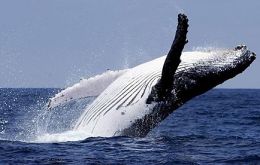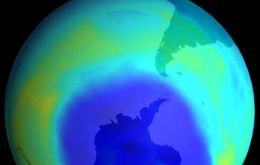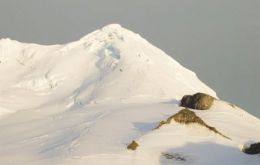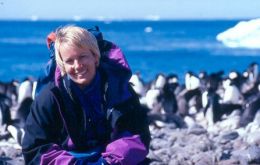MercoPress. South Atlantic News Agency
Tag: British Antarctic Survey
-
Saturday, May 24th 2014 - 00:16 UTC
Humpback whales in different oceans should be recognized as separate species, says genetic study

A new genetic study has revealed that populations of humpback whales in the oceans of the North Pacific, North Atlantic and Southern Hemisphere are much more distinct from each other than previously thought, and should be recognized as separate subspecies.
-
Monday, March 10th 2014 - 21:05 UTC
Scientists discover new man-made gases that are depleting the ozone layer

Scientists have identified four new man-made gases that are contributing to the depletion of the ozone layer. Two of the gases are accumulating at a rate that is causing concern among researchers. Worries over the growing ozone hole have seen the production of chlorofluorocarbon (CFC) gases restricted since the mid 1980s
-
Thursday, February 13th 2014 - 02:05 UTC
Satellite test counting of whales in Argentina's Peninsula Valdez and Golfo Nuevo

Scientists have demonstrated a new method for counting whales from space. It uses very high-resolution satellite pictures and image-processing software to automatically detect the great mammals at or near the ocean surface.
-
Saturday, January 18th 2014 - 05:41 UTC
HMS Protector surveying previously unchartered waters off Sandwich Islands

Previously uncharted areas of the Southern Ocean have been surveyed by personnel on board Royal Navy ice patrol ship HMS Protector. Using its multi-beam echo sounder the ship gathered data off the Sandwich Islands along areas of the Douglas Straits between South Thule and Cook Island for the UK Hydrographic Office to fill in missing data in the Admiralty Charts.
-
Wednesday, December 18th 2013 - 07:05 UTC
Kimberlite rocks found in Antarctica could mean the territory is rich in diamonds

The prospect that Antarctica could be rich in diamonds was published in the scientific journal Nature Communications, following the discovery by a team of a telltale rock called kimberlite in the Prince Charles Mountains in East Antarctica.
-
Tuesday, December 17th 2013 - 17:51 UTC
West Antarctic ice sheet loss, one of the multi-year projects to be started this year by BAS

With the Antarctic Summer well underway, British Antarctic Territory Commissioner Peter Hayes has sent his well wishes to British Antarctic Survey staff (BAS) working on the continent over the coming months. In a recent letter to UK Base commanders Dr Hayes commented:
-
Thursday, August 1st 2013 - 03:33 UTC
South Georgia company sponsors research on toothfish sustainability

Georgia Seafood is sponsoring pioneering research into the reproductive behaviour of the Patagonian Toothfish in South Georgia. Director of Georgia Seafood Stuart Wallace explained that in a market that demands sustainability it is important to the company that they support the science underpinning that aim.
-
Tuesday, May 14th 2013 - 05:35 UTC
Falklands’ linked scientist who helped identify ozone layer hole has died

The British Antarctic Survey scientist Joe Farman, who helped identify the “hole” in the ozone layer over the southern pole, has died. Dr Farman who was also a scientific officer at the Falkland Islands Dependency Survey, published the discovery with Brian Gardiner and Jon Shanklin in the Journal Nature in 1985.
-
Thursday, April 4th 2013 - 02:06 UTC
Expanding Antarctic sea-ice triggers different scientific explanations

Climate change is expanding Antarctica's sea ice, according to a scientific study in the journal Nature Geoscience. The paradoxical phenomenon is thought to be caused by relatively cold plumes of fresh water derived from melting beneath the Antarctic ice shelves.
-
Friday, March 22nd 2013 - 21:20 UTC
British Antarctic Survey has a new director: climate expert Professor Jane Francis

Professor Jane Francis has been appointed as the new Director of the British Antarctic Survey (BAS). Ms Francis, a geologist by training, is Professor of Palaeoclimatology at the University of Leeds where she is currently Dean of the Faculty of Environment.
